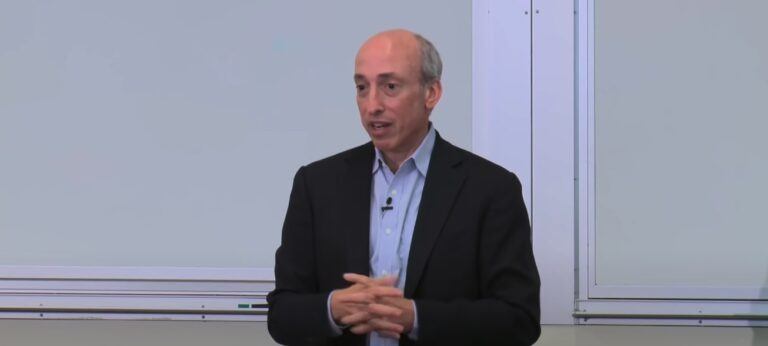In a revealing conversation with David Westin on Bloomberg TV’s “Wall Street Week,” Gary Gensler, Chair of the U.S. Securities and Exchange Commission (SEC), talked about the intricate challenges of regulating Bitcoin and the broader cryptocurrency market.
The Nuanced Approach to Bitcoin ETFs
Gensler recounted the SEC’s journey with Bitcoin-related products, particularly highlighting the approval process for spot Bitcoin exchange-traded funds (ETFs). Gensler said that in 2021 the SEC approved a product based on Bitcoin futures from the Chicago Mercantile Exchange. The decision to approve multiple spot Bitcoin ETFs in the U.S. on January 10, according to Gensler, was heavily influenced by a court ruling that challenged the SEC’s previous denials of similar products. This led to a strategic pivot towards approval, underscoring the SEC’s commitment to a sustainable regulatory approach amidst evolving market dynamics.
The Challenge of Non-Compliant Trading Platforms
A critical concern for Gensler is the prevalence of trading platforms operating outside the compliance framework of U.S. securities laws. Gensler maintains that despite Bitcoin not being classified as a security, its trading activity, along with that of numerous other crypto tokens, often occurs on platforms that fail to adhere to regulatory standards. He claims that this situation poses significant risks for investors, highlighting the speculative nature of Bitcoin and the potential for fraud and manipulation within these unregulated environments.
Gensler emphasized the importance of investor awareness regarding the speculative aspects of Bitcoin and the operational practices of many trading platforms. He urged investors to consider the use cases of their crypto investments, drawing a parallel to the more transparent and regulated nature of traditional stock investments.
The SEC’s Role in Ensuring Accuracy and Preventing Fraud
The conversation also touched on broader regulatory responsibilities, including the SEC’s oversight of public company disclosures and mechanisms to minimize errors, colloquially referred to as “fat fingers.” Gensler clarified that while the SEC plays a crucial role in preventing fraud and ensuring the publication of accurate financial information, companies bear the primary responsibility for their internal controls and the accuracy of their filings and press releases.
On the same day, Gensler was interviewed on CNBC’s “Squawk Box,” where he was constantly challenged — by co-anchor Joe Kernen — for stating on numerous occasions that Bitcoin’s two main uses are for cybercrime and speculation.
When Kernen said that fiat currency was used for crime a lot more than cryptocurrency, Gensler said:
“[Bitcoin] is the leading market share in ransomware, and that’s publicly known. It’s the token of choice for ransomware … The US dollar, the euro, the yen – you have the whole [of] society using [them] as a medium of exchange, we buy our cups of coffee, we get paid in dollars or yen or euro and you have a whole central bank and support for one currency, generally, per economic region... That, we don’t have here, so there is a very real economic difference …”
When Kernen mentioned the decentralized nature of Bitcoin as being a good thing (comparison to fiat currency, which is controlled by central banks), Gensler said:
“[Bitcoin] is not that decentralized…look at how finance tends toward centralization since antiquity. What do we have? We have a handful of three to six core so-called crypto exchanges.”









